
Democracy: An American Novel is a political novel written by Henry Brooks Adams and published anonymously in 1880. Only after the writer's death in 1918 did his publisher reveal Adams's authorship although, upon publication, the novel had immediately become popular. Contemporaneous conjecture placed the book under the joint authorship of Clarence King, John Hay and Henry Adams and their spouses who lived side by side on H street in Washington, D.C. and were collectively sometimes called "the Five of Hearts."
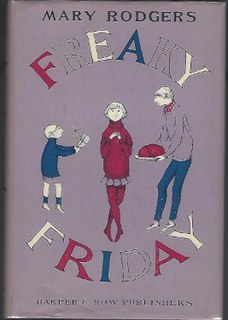
Freaky Friday is a comedic children's novel written by Mary Rodgers, first published by Harper & Row in 1972. It has been adapted for several films, including versions in 1976, 1995, 2003, and 2018, and was reinterpreted as a horror film for Freaky (2020).
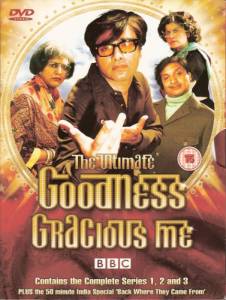
Goodness Gracious Me is a BBC sketch comedy show originally aired on BBC Radio 4 from 1996 to 1998 and later televised on BBC Two from 1998 to 2001. The ensemble cast were four British Asian actors, Sanjeev Bhaskar, Kulvinder Ghir, Meera Syal and Nina Wadia. The show explored British Asian culture, and the conflict and integration between traditional South Asian culture and modern British life. Some sketches reversed the roles to view the British from a South Asian perspective, and others poked fun at South Asian stereotypes. In the television series, most of the white characters were played by Dave Lamb and Fiona Allen; in the radio series those parts were played by the cast themselves. Some of the white characters were also played by Amanda Holden and Emma Kennedy.

Catalepsy is a nervous condition characterized by muscular rigidity and fixity of posture regardless of external stimuli, as well as decreased sensitivity to pain.

A Pale View of Hills (1982) is the first novel by Nobel Prize–winning author Kazuo Ishiguro. It won the 1982 Winifred Holtby Memorial Prize. He received a £1000 advance from publishers Faber and Faber for the novel after a meeting with Robert McCrum, the fiction editor.

The Hours is a 1998 novel written by Michael Cunningham. It won the 1999 Pulitzer Prize for Fiction, the 1999 PEN/Faulkner Award for Fiction, and was later made into an Oscar-winning 2002 film of the same name starring Nicole Kidman, Meryl Streep and Julianne Moore.
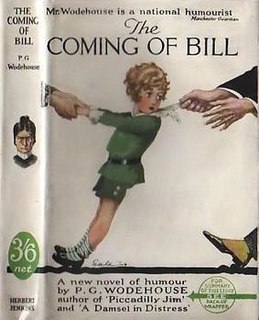
The Coming of Bill is a novel by P. G. Wodehouse. It was published as Their Mutual Child in the United States on 5 August 1919 by Boni & Liveright, New York, and as The Coming of Bill in the United Kingdom on 1 July 1920 by Herbert Jenkins Ltd, London. The story first appeared in Munsey's Magazine (US) in May 1914 under the title The White Hope.

Ellen Tigh is a fictional character from the re-imagined Battlestar Galactica series. She is played by the actress Kate Vernon.
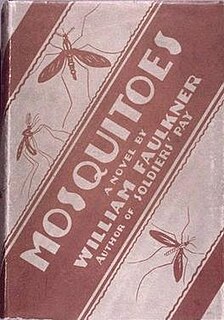
Mosquitoes is a satiric novel by the American author William Faulkner. The book was first published in 1927 by the New York-based publishing house Boni & Liveright and is the author's second novel. Sources conflict regarding whether Faulkner wrote Mosquitoes during his time living in Paris, beginning in 1925 or in Pascagoula, Mississippi in the summer of 1926. It is, however, widely agreed upon that not only its setting, but also its content clearly reference Faulkner's personal involvement in the New Orleans creative community where he spent time before moving to France.

Footfalls is a play by Samuel Beckett. It was written in English, between 2 March and December 1975 and was first performed at the Royal Court Theatre as part of the Samuel Beckett Festival, on May 20, 1976 directed by Beckett himself. Billie Whitelaw, for whom the piece had been written, played May whilst Rose Hill voiced the mother.
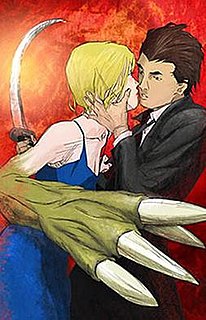
Kemonozume is a Japanese anime television series that was created, directed and written by Masaaki Yuasa, with Nobutake Itō in charge of character designs and Kei Wakakusa composing the music. The series was produced by Madhouse and aired on WOWOW from August 5 to November 5, 2006.
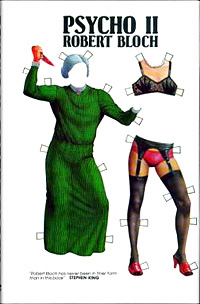
Psycho II is a 1982 novel by American writer Robert Bloch, a sequel to his 1959 novel Psycho. The novel was completed before the screenplay was written for the unrelated 1983 film Psycho II. According to Bloch, Universal Studios loathed the novel, which was intended to critique Hollywood splatter films. A different story was created for the film and Bloch was not invited to any screenings. Universal suggested that Bloch abandon his novel, which he declined and released anyway to good sales.
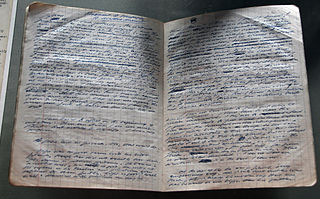
Embers is a radio play by Samuel Beckett. It was written in English in 1957. First broadcast on the BBC Third Programme on 24 June 1959, the play won the RAI prize at the Prix Italia awards later that year. Donald McWhinnie directed Jack MacGowran – for whom the play was specially written – as "Henry", Kathleen Michael as "Ada" and Patrick Magee as "Riding Master" and "Music Master". The play was translated into French by Beckett himself and Robert Pinget as Cendres and was published in 1959 by Les Éditions de Minuit. The first stage production was by the French Graduate Circle of Edinburgh, Edinburgh Festival, 1977."

All That Fall is a one-act radio play by Samuel Beckett produced following a request from the BBC. It was written in English and completed in September 1956. The autograph copy is titled Lovely Day for the Races. It was published in French, in a translation by Robert Pinget revised by Beckett himself, as Tous ceux qui tombent.
The Barbarian, also known as A Night in Cairo, is a 1933 American pre-Code romantic drama film produced and directed by Sam Wood and starring Ramon Novarro and Myrna Loy. Written by Elmer Harris and Anita Loos, and based on the 1911 play The Arab by Edgar Selwyn, the film is about an American woman tourist in Egypt who has several suitors, among them an Arab guide who is more than he seems. The film was released on May 12, 1933 in the United States by Metro-Goldwyn-Mayer. The play had been filmed previously by MGM as The Arab (1924) with Novarro and Alice Terry.

The Last Egyptian: A Romance of the Nile is a novel written by L. Frank Baum, famous as the creator of the Land of Oz. The book was published anonymously on May 1, 1908 by Edward Stern & Co. of Philadelphia, with eight color plate illustrations by Francis P. Wightman. Baum left his name off of the book because he was concerned that "masquerading as a novelist" might hurt his career as a writer for children; but he identified himself as the author of the book during his lifetime when making fantasy films for children proved a financial disaster.

A Suspension of Mercy (1965) is a psychological thriller novel by Patricia Highsmith. It was published in the US under the title The Story-Teller later the same year by Doubleday. It was the eleventh of her 22 novels.
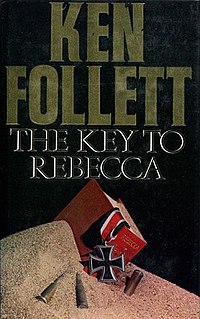
The Key to Rebecca is a novel by the British author Ken Follett. Published in 1980 by Pan Books (ISBN 0792715381), it was a best-seller that achieved popularity in the United Kingdom and worldwide. The code mentioned in the title is an intended throwback from Follett to Daphne du Maurier's famed suspense novel Rebecca.
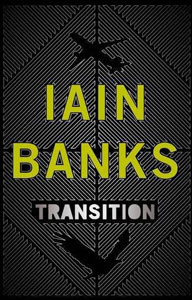
Transition is a novel by Scottish writer Iain Banks, first published in 2009. The American edition was published under the name "Iain M. Banks", which is the name Banks used for his science fiction work.
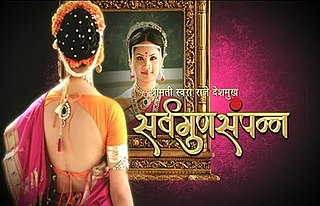
Shrimati Swara Raje Deshmukh Sarvggun Sampanna is an Indian television drama series that aired on NDTV Imagine.



















